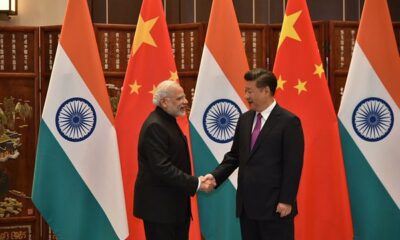Political Issues
This Regime Is Seeing What Others Don’t -By Tunji Ajibade


Tunji Ajibade
There is breaking news as I start to write this. The United Nations says it has resumed sending aid convoys into Syria. Three days earlier, its convoy was blown apart in one of the hot spots in Syria.
Drivers and aid workers were killed. At the time, the UN had said it was stopping all aid. Now, it has returned to the field. We can’t give up because of the people living in deprivation in war-torn Syria, the UN has said. Humanitarian needs always have to prevail no matter what happens, it adds. This has been the lot of the UN since its establishment. The world body isn’t my focus here though. Syria is.
It’s the fourth country in the series meant to shed light on the conflict in the Middle East that I’ve begun not long ago. Syria is the ground where powerful nations now show their presence and control.
Like the UN, these nations aren’t giving up too, but for different reasons. Against this background, the regime in Syria recently makes a boast that makes me wonder what it sees that other participants in the
conflict don’t.
Syria is a nation that should be the pride of the Middle East. Its estimated population of 18 million has some 74 per cent Sunni Muslims.
Other Muslim groups, including Alawites to which President Bashar al-Assad belongs, constitute some 13 per cent. Druze has three per cent; diverse Christian denominations and ethnicities make up another 10 per cent.
Syrian Kurds make up nine per cent. There are also Assyrians and other ethnic groups such as the Armenians, Circassians, Turcomans, Greeks, Mhallami, Kawliya, Yezidis, Shabaks, and Mandeans. Compared to their neighbours, Syrians have been raised on the diet of the West, educated and skilled. This is one reason Germany feels comfortable taking in Syrians. They’re economic assets that Africans aren’t. However, the
mess in which Syria has found itself is another confirmation of one observed phenomenon: When people have the good life, are exposed to western values, they will ask for more freedom especially the freedom
to choose. This is at the root of how Syria descends into a civil war.
In March 2011, some teenagers painted revolutionary slogans on a school wall in the southern city of Deraa. The alleged culprits were arrested and tortured. Pro-democracy protests followed the arrest. Security forces opened fire on demonstrators and killed dozens. More Syrians occupied the streets as socio-economic discomfort got mixed with the demand for more democratic freedom. The unrest that followed grew into nationwide protests. One demand was that President al-Assad should step down. The government deployed more force. Protesters refused to be cowed. By July, thousands were taking to the streets
throughout Syria. Soon, opposition groups took up arms. At first, they were defending themselves against government forces bent on enforcing law and order; then, they graduated to sending government forces away from their communities. Civil war broke out as rebel groups fought against government forces for control of cities, towns and the countryside. By 2012, fighting reached the capital, Damascus, and the second city of Aleppo. At the same time, the government commenced the use of large-scale artillery operations against the insurgency. There was destruction of many civilian homes due to indiscriminate shelling.
Daily protests had reduced by this time, as armed conflict became widespread. By June 2013, the UN said 90,000 people had been killed.
By August 2015, the figure was 250,000.
There are external and internal actors in the Syrian conflict. I reserve the former for another piece. Syrians were the first to pick up arms against their own government. Syria’s diverse groups take control of their parts of the country, taking charge as authorities.
Syrian Kurds took hold of the northern end; there, they had to contend with ISIS that had seized the opportunity of the chaos to extend its self-proclaimed Caliphate from Iraq to parts of Syria. The conflict
has since moved from being a battle between government forces and militias that are either for or against the al-Assad administration.
Now, it has sectarian coloration, and Syria’s Sunni majority is on the opposite end of al-Assad’s Shia Alawite sect. The sectarian phenomenon is an attraction for regional powers such as Iran and Saudi Arabia, one being Shia and the other Sunni respectively. The interesting thing though is that everyone – Syrian government forces, Syrian rebels, the
Kurds, Iran, Saudi Arabia, the Russians – have stated that ISIS (made up of Sunni elements) is what they want to dislodge from Syria. The same claim is made by the West that’s anti-al-Assad, anti-Russia and Iran that are pro-al-Assad.
The Syrian regime gained strength when the Russians came on the scene.
Now, the future of Syria is in the hands of Russia and the United States. Lately, both powers brokered a temporary ceasefire. Each side was meant to hold the groups that it supported in the Syrian war in
check for the period of the ceasefire. Neither could as a UN convoy with aid for civilians inside Syria was attacked; the ceasefire collapsed and war resumed. This shows how tenuous the control of each power on the warring groups inside Syria is. Yet, the US and Russia can make the conflict last indefinitely. This is a possibility as it’s obvious that victory for any of the Syrian parties isn’t in the interest of the outsiders involved in the conflict.
Reasons? The Sunni Islamist forces dominate the resistance to the Syrian government, but the most powerful of them are the most radical.
These rebels’ main component parts seek the establishment of a state dominated by Islamic Sharia law. If they defeat the al-Assad regime and reunite Syria under their rule, what will emerge is a Sunni Islamist dictatorship. This is unacceptable to the West that supports some of them. It needs them as local allies to deal blows to ISIS, but the West doesn’t want radical Islamists in power in Damascus in a possible post-al-Assad dispensation. Russia that has significant Muslim population doesn’t want this too.
As for the Syrian Kurds, they want to break away but all the countries that also harbour Kurds in the Middle East won’t want it. Equally, it’s a disaster for the West for al-Assad’s regime to win. But Russia and Iran want this. Al-Assad has a few things going for him here; there’s an anti-Western coalition in the Middle East and he has a working arrangement with them. Iran leads this coalition, and Hezbollah in Lebanon, the Shia militias of Iraq, and the Palestinian Islamic Jihad tag along. Victory for Damascus means this alliance places under Iran the land area from Iran, Iraq, Syria and Lebanon on
the Mediterranean Sea. It’s one regional hegemony that the West will do all it can to disrupt. Moreover, victory for al-Assad over opposition forces in Syria is good for the Shia version of Islam. Iran loves it; but everyone else will argue that this isn’t good for peace the world over. Saudi Arabia is one of them.
For the moment, matters are so complex that victory for any of the Syrian actors is too remote to consider. But al-Assad said on the day of the last Muslim festivity that his government would take back every part of Syria. When he was asked lately about the use of barrel bombs by his forces, al-Assad said “bomb is bomb” and there was nothing peculiar about barrel bombs which he had been accused of using to kill unarmed civilians in rebel-held areas. It means he’s prepared to continue to kill civilians for a long time yet. Al-Assad’s confidence to be victorious in this conflict makes me wonder how his regime will do it. For as long as the West continues to back its local allies Damascus cannot have outright victory.
The West is likely to do this rather than watch other stated possibilities to happen, including losing to Russia in a Middle East conflict that has become a test of will.
Where does this leave Syria? Political negotiation leading to a cessation of the battles is the reasonable path to follow. However, with the position Damascus has taken that it can win back all its territory, this is going to be a long-drawn out civil war. When all sides are eventually dragged to the negotiation table, the outcome is likely to be that Syria won’t exist as it used to be as a unitary state.



















